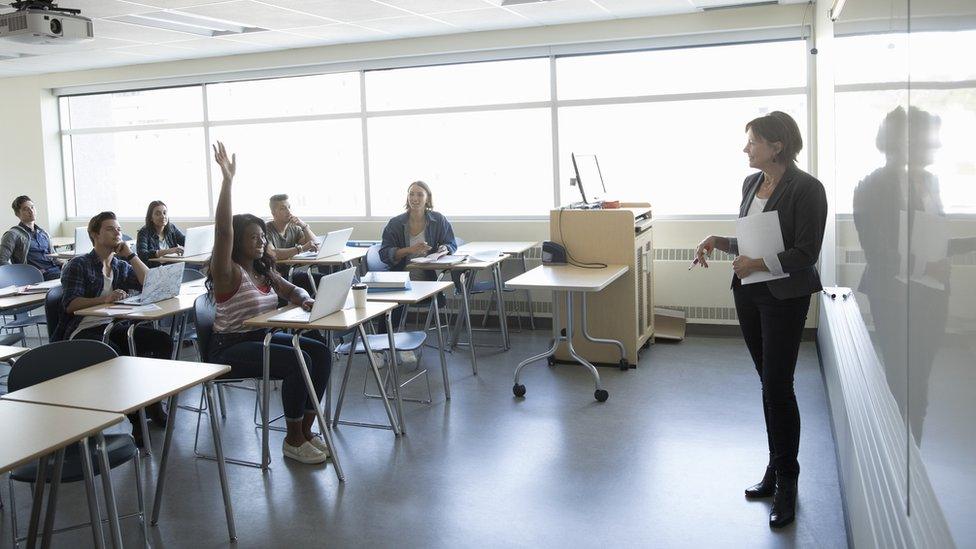Could you cope with eight different jobs a week?
- Published

Some academics have complained of "poverty wages"
Could you cope with eight different jobs a week? Alice did it last year trying to make ends meet.
It's not the lifestyle you imagine for a highly educated associate lecturer.
Insecure work isn't something you'd normally associate with the world of academia.
But that's all Alice, aged 31, has ever known.
"It's just exhausting. You've got no security. And you've always got to be scouting for work for the next term or academic year.
"Financially, it's impossible. In terms of the future, friends have houses, got mortgages, cars. I've no savings, living in debt and there's the impact on my mental health. I've suffered from anxiety and depression from my work situation."
We haven't used her real name, because Alice fears she might lose what few hours of work she's got.
She's currently on a contract with four hours of guaranteed teaching a week in term time at a university in the south of England. She gets paid £40 an hour, which includes her preparation and marking.

There are too many short-term contracts in universities, some warn
"I'm usually doing many more hours on top of that, unpaid, to get all the work done. If you're teaching a new module, it works out less than the minimum wage because of all the extra hours demanded to do the role, from reading time to liaising with students. I would say it's poverty wages."
Alice has just finished her PhD, teaching along the way. Last year she found herself shuttling between three different higher education institutions, doing five to six hours in each. She also worked in a bar and taught in schools to top up her pay.
Alice says that, in her department, there are more people being paid by the hour than there are full-time staff - and they are also doing most of the teaching.
'Secure job'
"It's ridiculous given the level of knowledge and experience I have. I think many full-time staff are embarrassed, as we're a bit like a ghost workforce who come in for a few hours, do the teaching and leave. I also work in a cinema at the moment which is a more secure job to me," she says.
Five other academics, in different parts of the country, including one of the Russell Group universities, tell similar stories of insecure work.

One of them, who's now managed to secure a permanent contract, spoke of how he was forced to take occasional naps in his car in between teaching and working part-time cleaning the streets.
So how much teaching in our universities is being delivered by academics who are hourly paid or on insecure contracts?
Jonathan White, the University and College Union's (UCU) bargaining policy and negotiating official, says: "We've argued for years that a lot of the teaching in universities is, in fact, done by people precariously employed, struggling to make ends meet and universities have been trying to sweep it under the carpet."
He sent a freedom of information request to 135 higher education institutions last year, seeking figures on the amount of teaching delivered by hourly paid staff. More than half either wouldn't or couldn't disclose any data; others provided partial information, including Alice's university.
Only 38 universities provided useable material on the 2015/16 academic year, with lots of caveats over its accuracy. In other words, it's not possible to draw any clear-cut conclusions. But it did throw up some interesting examples.

University College Birmingham reported just over a quarter of its teaching was done by hourly paid staff
For instance, the University of Derby reported just over a quarter of its teaching was done by hourly-paid staff. So did University College Birmingham.
According to Mr White, there's enough information to show the problem's much bigger than universities want to admit.
"What we're trying to do is an approximation of scale," he says.
"What we found is broadly what we thought we'd find. There are tens of thousands of people teaching hundreds of thousands of hours of education who are being paid by the hour."
University employers say the report is flawed and misleading, along with all the other research the UCU has done.
Their association, UCEA, believes casual staff do a very small amount of teaching.
"The quality of very many degree programmes at higher education institutions today is frequently enhanced by input from skilled professionals from outside the sector contributing specialist teaching on specific courses," it said in a statement.

"Such input is hugely valued by students and is often essential for the programme's accreditation. Hourly-paid teaching and tutoring also provide important developmental opportunities for postgraduates, particularly for those interested in a future career in the sector."
The Higher Education Statistics Agency (Hesa) is responsible for publishing the official data. It says the data, as it's currently gathered, doesn't give a straight answer on the level of precarious employment in academia.
"We do know that around one third of academic staff, around 70,000 people, are on fixed-term contracts. We don't know much detail below that. For instance, how they feel or how many hours they do or anything like that level of data. It's just not obvious," says Hesa's chief executive, Paul Clark.
Hesa, he says, is hoping to start publishing more detailed analysis on employment in a year or so's time.
'Much more freedom'
For universities, short-term contracts have become more important then they used to be.
Nick Hillman, director of the Higher Education Policy Institute, an independent think tank, says: "Universities look and feel just a little bit more like running a business than they used to.
"One thing that's changed, for example, is that students have much more freedom about which university they go to and universities are now free to recruit as many students as they like.
"It's a volatile situation. There are uncertainties about Brexit, how many international students there will be and part-time numbers have more than halved.
"The other thing is they want to expand popular courses and shut down less popular ones. And if you've got staff on more flexible contracts these are easier things to do."
Another reason, he says, is the focus on academic research which brings more prestige and big research contracts to universities. But it can mean less time for teaching so universities are left with holes in their timetables to fill.
"I worry that we have got an imbalance, that we have too many of the short-term, temporary contracts. If you're an ambitious academic, you want the security of a full-time position, it allows you to settle down," Mr Hillman says.
"Not everyone wants a full-time job, of course. But it's absolutely the right time to be talking about these things, having this debate. If we want happy students and successful universities we want happy staff."
Alice loves teaching and is still pursuing her dream of an academic career, for now.
"I'm stuck in this limbo position. It's ridiculous given the level of knowledge and experience I have.
"I'm applying for full-time jobs now. If I don't have anything by September I will have to evaluate whether I continue. I just don't want to oppress myself anymore. "
- Published23 February 2018

- Published7 February 2018

- Published10 January 2018
